Google is reportedly going to launch a censored version of its search engine in China.
The tech giant has been secretly planning to launch the product since last year, as part of a project referred to inside the company as ‘Dragonfly,’ according to The Intercept, which was given internal documents from a whistleblower.
It comes as Google has tried and failed to make inroads in the Chinese market over the past several years.
Google has been planning to launch the product since last year, as part of a project referred to inside the company as ‘Dragonfly.’ The firm has been trying to make inroads in the country
Google’s search engine, Gmail and YouTube have all been blocked from access in the region since 2010, when federal regulators, often referred to as China’s ‘Great Firewall,’ shut down more than 1.3 million websites.
Development of the search engine sped up after Google CEO Sundar Pichai met with a top Chinese government official in December 2017, the Intercept noted.
Programmers and engineers at the company have created several versions of an Android app, called ‘Maotai’ and ‘Longfei,’ one of which has been presented to the Chinese government.
Should it be approved by government officials, a final version could be launched as soon as the next six to nine months.
The app would have to comply with China’s rigid censorship laws, which would mean restricting access to content that government officials consider unfavorable, the Information said.
Search terms about human rights, democracy, religion and peaceful protests will be blocked from the app.
When someone uses the search engine, banned websites won’t be included in the first page of search results, with websites like BBC and Wikipedia part of a list of banned sites.

Google’s search engine, Gmail and YouTube have all been blocked from the region since 2010, when federal regulators, referred to as China’s ‘Great Firewall,’ shut down 1.3 million websites
It will censor results in Google’s image search, spell check and suggested search tools.
Few people inside the company are aware of the existence of project ‘Dragonfly,’ but it has received pushback from a few employees.
‘I’m against large companies and governments collaborating in the oppression of their people, and feel like transparency around what’s being done is in the public interest,’ a source with knowledge of the project told the Intercept.
The reported plans have already drawn the ire of free speech advocates, who say the app goes against what many believe to be Google’s value systems.
On Wednesday, human rights group Amnesty International issued a statement on Google’s reported plans.
‘It will be a dark day for internet freedom if Google has acquiesced to China’s extreme censorship rules to gain market access,’ Patrick Poon, China researcher at Amnesty International, wrote in a blog post.


‘It is impossible to see how such a move is compatible with Google’s “Do the right thing” motto, and we are calling on the company to change course.
‘In putting profits before human rights, Google would be setting a chilling precedent and handing the Chinese government a victory,’ he added.
Google declined to comment on the Intercept report, but said it has launched mobile apps in China and works with local developers to maintain a presence in the region, according to Reuters.
The firm had launched a restricted search engine in China in 2006, but ultimately shuttered the platform in 2010 after it received widespread backlash.
It was reported in 2015 that Google was looking at launching a version of its Google Play mobile store in China, but that has yet to materialize.

Development of the search engine sped up after Google CEO Sundar Pichai (pictured) met with a top Chinese government official in December 2017, the Intercept noted
Google, Apple, Facebook and other tech giants have struggled to break into China’s massive mobile market, which boasts some 750 million web users.
Apple and China, in particular, have clashed over the continued presence of VPN apps, which allow users to get around the country’s firewall, on Apple’s App Store.
The firm ultimately bent to China’s demands and has removed most VPN apps from its App Store in the country, which resulted in widespread backlash from human rights groups.
